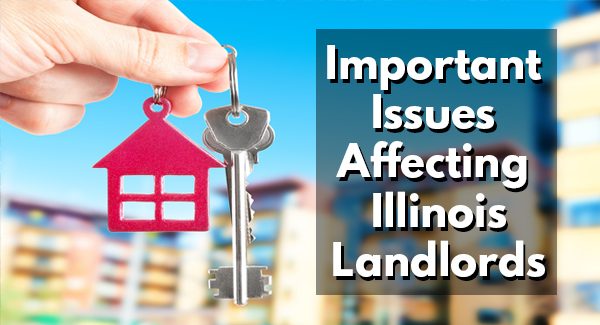EVICTION MORATORIUM ONLY STAYED THROUGH JULY 26, 2020. Governor Pritzker had previously announced that he would stay the filing of new evictions, and the performance of eviction orders by the Sheriff, through July 31, 2020. However, the Governor released Executive Order No. 44 on June 26, 2020 which only stays evictions through July 26. The remainder of the article below is still in effect.
We previously reported that Illinois Governor Pritzker extended the stay date regarding evictions with Executive Order 39. The order continued the ban on the commencement of any residential eviction or the enforcement of any commercial or residential eviction until June 27, 2020.
On Wednesday, June 17, 2020, Governor Pritzker announced that he will extend the moratorium on evictions in the state until July 31, 2020. According to the Governor, the extension of the residential eviction ban through July 31, 2020, is an effort to “give people a smooth transition into new assistance programs” which are expected to go into effect on August 1, 2020. The assistance programs are designed to assist tenants affected by the COVID-19 pandemic to repay past due rents to landlords.
We expect the Governor to issue an extension order on or before June 27, 2020. If the new order maintains the same requirements as the current Executive Order relating to evictions, a landlord will not be allowed to initiate any residential eviction until August 1, 2020, unless the tenant poses “a direct threat to the health and safety of other tenants, an immediate and severe risk to property, or a violation of any applicable building code, health ordinance, or similar regulation.”
Once the stay is lifted, landlords can once again issue termination notices and file evictions. It is important to note that the Executive Order does not waive the tenant’s obligation to pay rent. Further, rent will continue to accrue as the lease dictates. Some tenants have misinterpreted the Governor’s Order and believe their rent is waived which is creating large unpaid balances on their accounts. Keep in mind that Chicago landlords will be facing additional requirements for non-payment notices pursuant to Mayor Lightfoot’s “COVID-19 Eviction Protection” Ordinance passed on June 17, 2020 once the stay is lifted (see KSN blog article: City of Chicago Adopts COVID-19 Tenant Impact Ordinance).
Finally, landlord must be aware that the federal Coronavirus Aid, Relief, and Economic Security Act (“CARES Act”) also provides an additional stay for evictions. Specifically, the provisions of the CARES Act prohibit landlords who own rental properties with federally backed loans or who obtain federal assistance (ex. Section 8 voucher programs) from initiating eviction proceedings against their tenants through July 25, 2020. The CARES Act provides further protection to subsidized tenants by requiring that landlords serve a 30 days notice, rather than a 5 days notice for non-payment of rent. Subsequently, the earliest an eviction could be filed for such property would be technically be August 24, 2020.
Our law firm will continue to monitor the ongoing changes with the eviction process and their impact on landlords and rental property managers. If you would like to speak to one of our attorneys for additional explanations of the Executive Order, CARES Act or the most recent changes with the Illinois Eviction Act, KSN attorneys can be reached by calling 855-537-0500 or by visiting ksnlaw.com.
Since 1983, KSN has been a legal resource for condominium, homeowner, and townhome associations. Additionally, we represent clients in real estate transactions, collections, landlord/tenant issues, and property tax appeals. We represent thousands of clients and community associations throughout the US with offices in several states including Florida, Illinois, Indiana, and Wisconsin.
Please note the material contained in this article is for educational and informational purposes only and does not constitute legal advice. No attorney-client relationship is established by your review or receipt of the information contained in this article. You should not act on the information discussed in this article without first obtaining legal advice from an attorney duly licensed to practice law in your State. While KSN has made every effort to include up-to-date information in this article, the law can change quickly. Accordingly, please understand that information discussed in this article may not yet reflect the most recent legal developments. Material is not guaranteed to be correct, complete, or up to date. KSN reserves the right to revise or update the information and statements of law discussed in the article law at any time, without notice, and disclaims any liability for your use of information or statements of law discussed on the article, or the accessibility of the article generally. This article may be considered advertising in some jurisdictions under applicable law/s and/or ethical rules/regulations. © 2020 Kovitz Shifrin Nesbit, A Professional Corporation.

